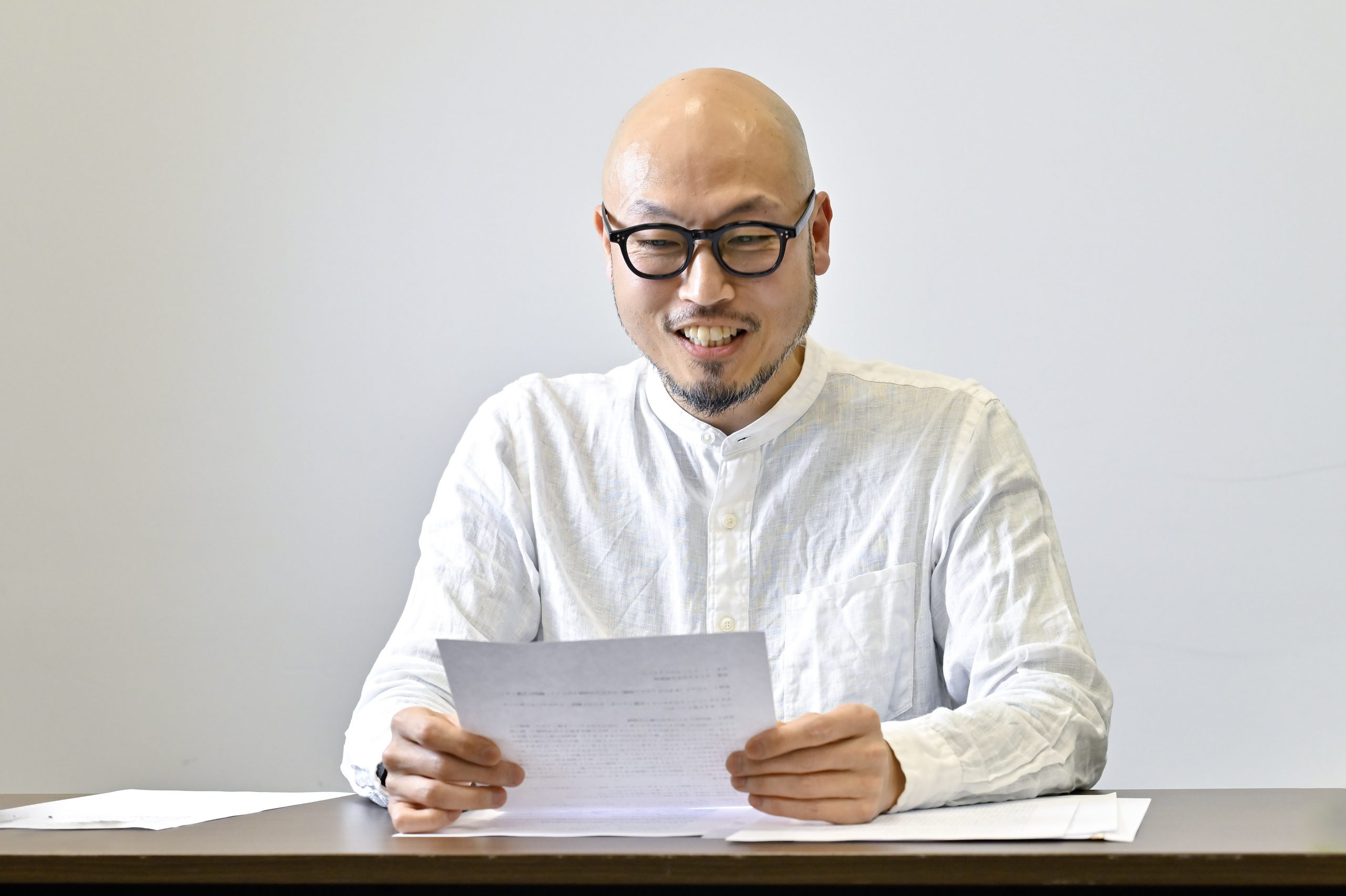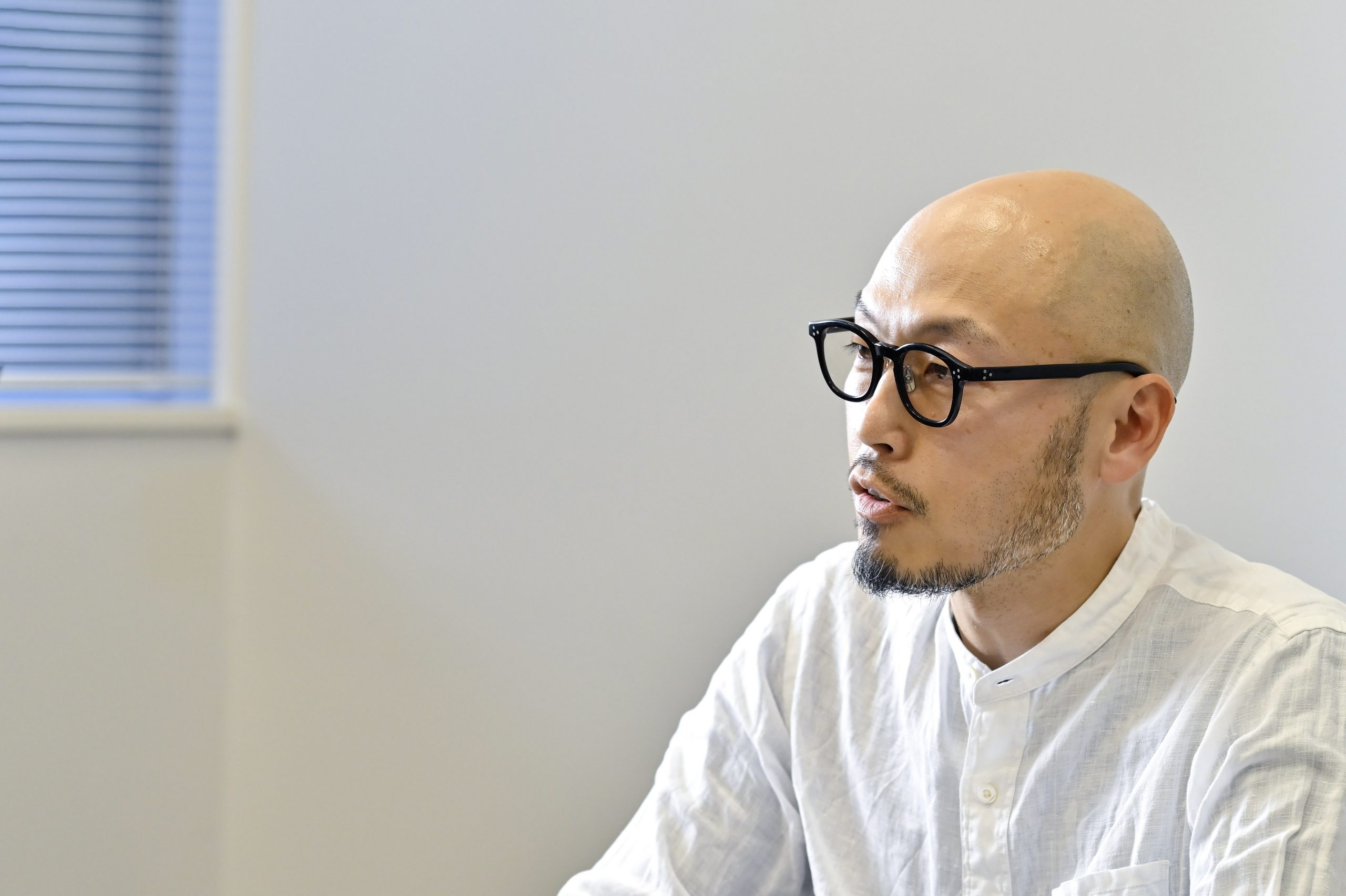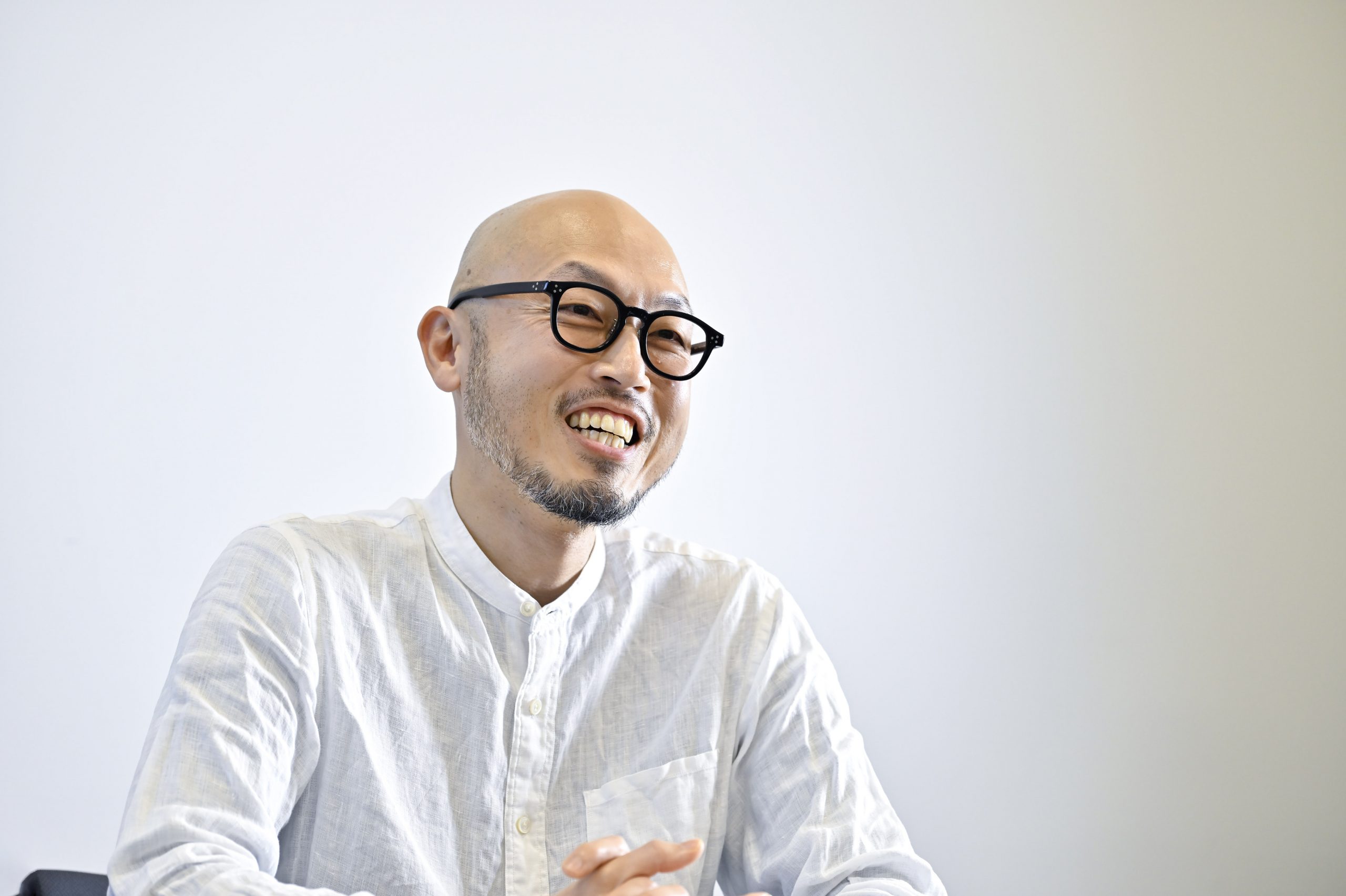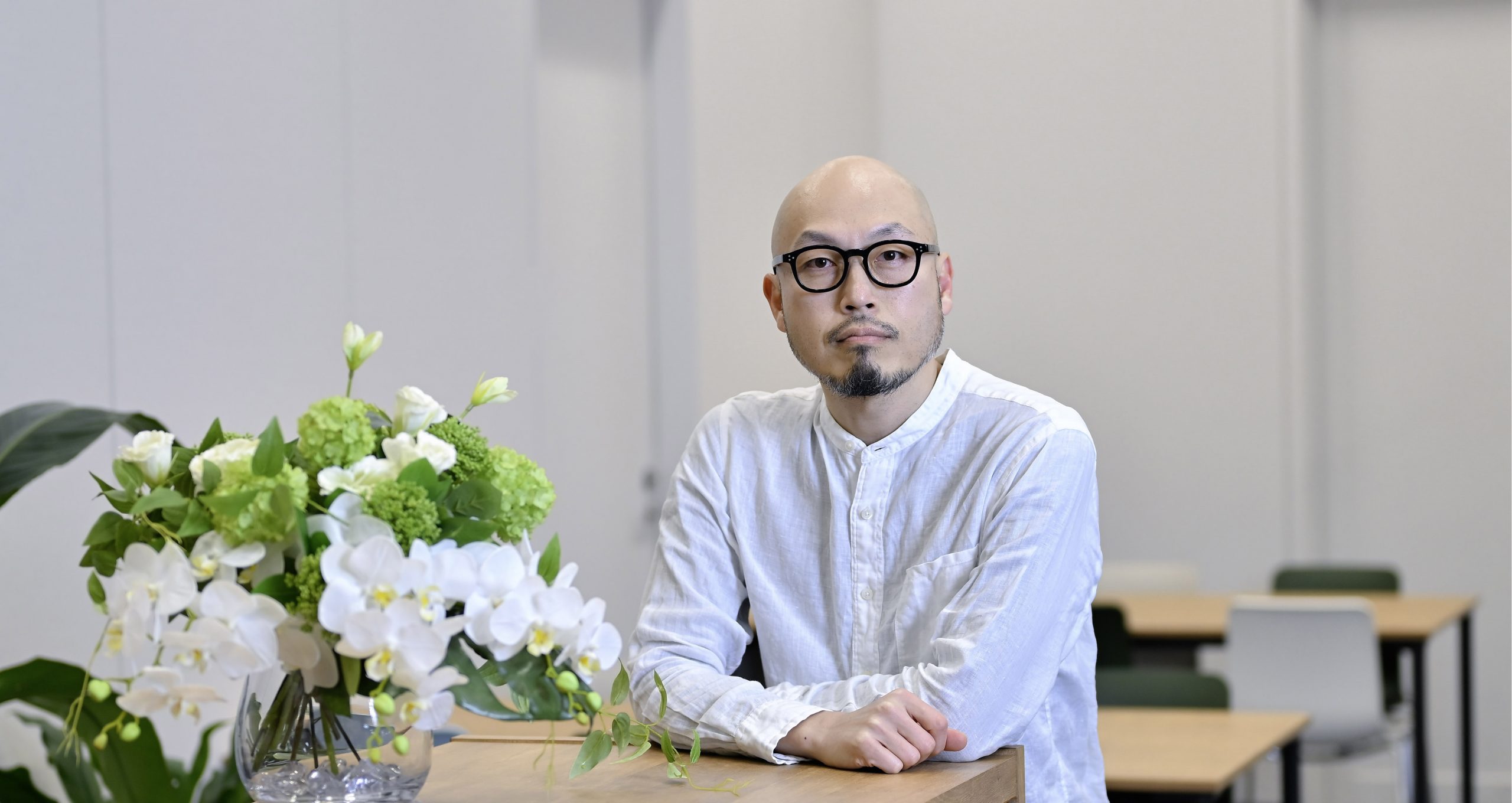
Tomohiro Maekawa
Tomohiro Maekawa and Six Translators: How do Maekawa’s Plays Read on the International Stage?
Photo: Akihito Abe

Photo: Akihito Abe
Tomohiro Maekawa
Playwright and director Tomohiro Maekawa was born in Kashiwazaki, Niigata Prefecture, in 1974. After graduating with a in philosophy from Toyo University, he founded his theater company and the base for his activities, Ikiume, in 2003. His unique style incorporating elements of science fiction, philosophy, and the occult has attracted much attention and acclaim.
Internationally, productions of his work are increasing. Maekawa’s work was performed in Seoul by Korean actors, first in 2019 with Strolling Invader, followed by The Sun in 2021. When The Sun was then restaged at the National Jeongdong Theater in 2023, a dance piece of the same name was also performed.
In 2021, Ikiume staged À la marge in Paris to critical acclaim. In recent years, his plays continue to be published in a variety of languages, including French, Korean, Spanish, English, Russian, Arabic, and Chinese.
Maekawa has won several prizes in Japan, most recently the Excellence Award at the 31st Yomiuri Theater Awards for To Deliver a Soul, which was staged in 2023. (Updated April 2024)
Tomohiro Maekawa, director, playwright, and head of the Ikiume theater company, has become a regular winner of awards for his works that always generate a buzz in the theater world with their unique, occult-like approaches. As his reputation continued to grow in Japan, he made a bold foray into a new field in 2016, when he began staging readings and performances of translated versions of his plays The Sun and Strolling Invader in London, Paris, Seoul, and more. In 2021, French and Korean translations of Strolling Invader were published. As part of the Japan Foundation’s online streaming series of outstanding Japanese performances, STAGE BEYOND BORDERS, The Sun was streamed with subtitles available in English, Spanish, Russian, Chinese (Simplified and Traditional), French, Korean, and Japanese, garnering 153,889 views. The screenplay was then published in several countries in English, Spanish, Russian, Chinese, and Arabic. In the same year, it was performed in Korean in Seoul (directed by Kim Jeong), and actor Kim Jeong-hwa won Best New Actor at the Dong-a Theater Awards. In 2022, Ikiume performed À la marge in Paris with French surtitles, and in 2024, The Obelisk of the Beast was added to the STAGE BEYOND BORDERS lineup. Translated stagings of Mathematical Domino and Enemy of Heaven are scheduled for the near future in Korea and Taiwan.
As Tomohiro Maekawa’s theatrical world continues to expand, how are his works being received overseas? We asked Arabic, Spanish, Chinese, Korean, English, and French translators of his works for their reflections as well as Maekawa himself about this response, his past experiences, and future plans for his involvement with other countries.
Interview/text: Nobuko Tanaka
English translation: Claire Tanaka
- I believe your international connections began in 2010, when you participated in an international residency at the Royal Court Theatre in London. What did you gain through experiencing the theater scene in Britain firsthand?
- I sent them a draft that I had written ahead of time, and then spent a month on-site brushing it up. In Japan, I’m usually working with a fixed performance schedule, so I finish the play in time for that, or what often happens is we will begin rehearsals before the script is completely finished and I work on it as we go. I had never really experienced brushing something up like that before. In Britain, an English translation of the draft would be staged as a reading with local actors, we would discuss the script and identify the issues, and then I would rewrite it, and the cycle would start again. In addition to playwrights, there were actors, directors, dramaturges, script supervisors, and theater staff all together, and we held these discussions in a broad group.
I thought that worked well, so I implemented the same method as soon as I came back to Japan. I had a theater company, so even if we weren’t in rehearsals, I would share what I had at the idea stage with the company, and sometimes have actors do readings and give me feedback which I would use in my writing.
After that, the company began putting on revivals of past productions. With new works, I often don’t completely understand what I’m writing, but the process of restaging a work enables me to analyze the script objectively and uncover themes and so on. I remain aware of the need to focus on certain parts of the script that resonate more with the present, and in this way I learned to tackle restagings.
Mind you, although it did teach me the benefits of collaborative work, there were things that didn’t work out so well. At one point, I gathered a lot of people from far and wide who were interested in making a story as a team and created the Ikiume Literature Club. There was a diverse group of people with musicians, dramaturges, aspiring novelists, and so on, and we made a script from zero, together as a team. That was really, really fun, but in the end we gave it up. The responsibility was spread across too many people, and my own individuality got watered down, so it made me realize that a script should be written alone. A playwright must write in solitude. [Laughs] Stephen King once said, “Write with the door closed, rewrite with the door open (and get opinions from others).”
- Tell me your reflections upon reading the comments written by the people who translated your work for overseas audiences.
- The person who translated The Sun into Arabic said: “If it included specific names of countries, and audiences started thinking about which people it meant from which countries, I think some would get offended, but no names are mentioned.” He took a favorable view of how country names don’t appear in the work. I thought The Sun was a story about discrimination, but on a national level. The way people from poorer countries flow into richer countries as refugees—that international level was not something I was thinking of. I was very happy to learn that my play was being perceived in such a big way. The Sun is set in Japan in the near future, and the Nox are an evolved type of humans who call ordinary humans Curios and control them. Structurally, the idea of the center and the rural areas is a metaphor that is easy for us to understand, but I was very surprised to learn that it was interpreted overseas through the lens of the discrimination and division that exists in each region.
-
Translator Comment 1 Arabic: Prof. Dr. Maher El-Sherbini
This is a very good work, and I think Mr. Maekawa is a genius. It deals with an important theme, and he was able to introduce the theme in excellent ways and angles. It handles social issues that transcend time and place, and I personally really like the play. I think there are many ways to interpret it, but I felt like it reflected the ways people in economically advanced and less advanced countries think. People from less developed countries want to be more like the advanced countries, and I felt that was expressed in the work. There are twenty-four chapters, and I think this is referencing the twenty-four hours in a day. I was born here, but would things have been better for me had I been born somewhere else? If I left this society and became a member of another, what would that be like? What sort of problems do those people have? It has many angles and is a very meaningful work. I hope that Egyptians and people of the greater Arabic-speaking world will read it. If it included specific names of countries and audiences started thinking about which people it meant from which countries, I think some would get offended, but no names are mentioned. This is a very international way of dealing with that issue and I thought it was skillfully handled. This theme is easy for all people to understand. Mr. Maekawa’s way of thinking is international, and he deals with international issues. (Interview/text: The Japan Foundation, Cairo)
-
Translator Comment 2 Spanish: Laura Asquerino Egoscozábal
Overall, it wasn’t difficult to understand the content nor to translate it. The most difficult part was to enter the world of the work and think about how to write words like “Nox” and “Curios” in Spanish, which were original words created by the playwright. But having experienced the COVID pandemic, it was easy to imagine being in such a situation. I imagine the readers will also feel this way.
One thing I can talk about is my first encounter with Mr. Maekawa’s The Sun. While it is a work of science fiction (or at least, a kind of science fiction), a Buddhist mindset also flows through it at a deep level, and that’s what most strongly drew my interest. I felt this only nebulously while translating, but afterwards, when I was asked to write a comment about the work and an introduction to the writer, it became clearer to me. But since this doesn’t come across directly through the work, it wasn’t easy to convey it to readers via my translation. I think, though, this is one of the appeals of Mr. Maekawa’s work, and perhaps also a goal. Either way, I consciously tried to give Spanish readers who would be reading it in translation the same feeling as a reader of the original Japanese might feel. -
Translator Comment 3 Chinese: Lin Shaohua
I haven’t made a survey so I can’t say for certain, but as a translator, I am first a reader, and from what I heard from my coworkers who also read the play, it was fitting, or should I say ironic, how the publishing of The Sun coincided with the spread of COVID, and inevitably made me think deeply about the current state of the world and the future of humanity, and I was really impressed. In that sense, it’s hard not to admire the foresight of the writer, Tomohiro Maekawa. I don’t know if his foresight was intuition, or the product of long hours of research, but it’s wonderful at any rate. I was very impressed.
-
Translator Comment 4 English: Nozomi Abe
I checked various things with my British playwright friend, and I was surprised that he picked up on a lot of the messages thanks to his fondness for science fiction even from my directly translated version. I suppose sci-fi fans share a sort of universal language. I think he must’ve immediately identified the motifs and homages to classic SF novels and films.
The environment surrounding the characters in The Sun bore such a close resemblance to the situation that people around the world were forced into by the COVID pandemic, which I think created a strange sympathy. Buying a second home in the countryside, thinking seriously about self-sufficient farming, experiencing deepening rifts between yourself and others, arguing about vaccines . . . The story unfolds as if he knew this situation would actually happen. It looks to me as if The Sun itself is a sort of prophecy. I think a lot of people were really moved by this work, but also felt some shivers running down their backs.
If I may say so myself, it is very difficult to successfully stage a show with strong science fiction elements. I think it’s nearly impossible, but the appeal of Mr. Maekawa’s work is how he is able to achieve the theatrically impossible. There’s a lot that can be created with effects and special effects in novels and films, and live performance is very limited in that sense. To build a new world within those constraints and show it to an audience, I feel like that’s a miracle—it’s practically magic.
- One good thing about The Sun is that I didn’t think about it thematically. I based the work on Richard Matheson’s I Am Legend and started off just from curiosity about how I could write about a similar setting. First, I used the society we live in now to create the background for the near future depicted in The Sun and then I tossed the characters into that scenario. While I was writing, I began to notice the many real issues that the setting touches on.
The deceit of the Nox is the deceit of capitalism, the way capitalism exploits developing nations while nominally supporting them. When we restaged it, I consciously wanted to make the themes clear, and in order to ensure it wasn’t too clumsy and didactic, I worked on rewriting and directing the play to reflect the feelings of the characters. I made it with a high degree of fictionality, so even for people in other countries, it’s possible for them to see their own social problems and conditions in the play. This is what I’ve learned from the comments of the translators.
I wasn’t thinking about staging it overseas, but basically, I always try to place my work some distance from contemporary Japanese behavior, as it were, and I try not to include trendy phrases or topics. I’ve always tried to avoid making things too local. I set all of my stories in an imaginary town called Konrin-cho. It’s a regional city that could be anywhere, actually anywhere in the world, so perhaps that worked out for the best.
- In 2022, À la marge was staged in France with the Japanese Ikiume cast. France is a country where existentialism has penetrated deeply, so I it was perhaps the perfect work to put on in France.
- Someone from the Maison de la culture du Japon à Paris saw a Tokyo performance and apparently had a gut feeling that it would go over well in Paris. I also thought that the setting for À la Marge was similar to Sartre’s No Exit, and I figured it had some existentialism in there, so I agreed to take the play to France. The translator also told me that the play “follows a French logic,” and that made sense to me.
-
Translator Comment 5 French: Miyako Remondet (translator of À la marge)
The spread of nothingness, or mu, is one theme in this work, and there is a tendency to think that people who know about Buddhist concepts will find it easy to understand. However, Mr. Maekawa’s conceptual ideas goes beyond words, and because he furnishes his works with universal characteristics, French people were able to easily understand. The presence of quantum mechanics in French cultural knowledge may be a significant contributor to this. Even if detailed explanations were not possible on the spot, the French people have accumulated fragments of quantum mechanics hypotheses, which surely made it possible for them to imagine the strange world that Mr. Maekawa presented. But overall, I think the audience was moved by Mr. Maekawa’s logic-defying philosophy.
One part that French people found relatable was the scene where a conversation reveals that the younger brother of the protagonist is having an affair with the wife of another character. The scene plays out in a serious and somber way, so when that topic arose, the audience laughed as if in relief. Likewise, in the end when the wife suggests, “You can collect unemployment insurance.” I’m sure she is making a serious suggestion out of genuine concern, but as many people in France skillfully manipulate such systems, the audience couldn’t help but chuckle.
The dialogue in Mr. Maekawa’s works develops very naturally, so when translating into French, I tried to reflect the naturalness as much as possible. Although it begins in a realistic setting, there are many unexpected developments waiting, which gives it a very appealing, cinematic quality. And like I mentioned earlier, Mr. Maekawa’s works are imbued with his own philosophy, which I think resonated with the French people, resulting in a favorable reception. After the show, an audience member said to Mr. Maekawa, “I want you to put on your next play in Paris as soon as possible.”
(Interview/text: performing arts advisor Aya Soejima)
- I was happy to know that the local audience enjoyed it. It was very strange to me how the line about unemployment insurance went over so well in France. The wife is concerned and says, “You’re mentally ill, so maybe you can get unemployment insurance from your employer.” And it really stands out. In Japan, nobody reacted at all! [Laughs] In France, there’s a way of thinking that people should take full advantage of the support available to them, so it seems the shrewdness of the wife was a point of humor for them. The audience paid close attention, and the applause after the show was very passionate, and I got a lot of questions about the content. I felt like a lot of people took an interest, and I was glad we put on the show.
In the translator’s comment, she suggests that quantum mechanics being part of French culture may have significantly contributed to why my work was accepted in France, and that both surprised and intrigued me. During the play, we talk about nothingness existing. This is Buddhist, while at the same time, in quantum theory, there is a phenomenon of something coming from nothingness. I also talk about “going through the gaps between molecules” and that sort of thing might have overlapped with that image of quantum mechanics.
Still, it was performed in Japanese with surtitles, so I felt like it never left the realm of an “introduction.” People can’t help but focus on reading the surtitles. In a play, it’s very important to watch the actors moving and acting on the stage, after all. In that sense, next time I hope we can put it on with French actors, in French.
-
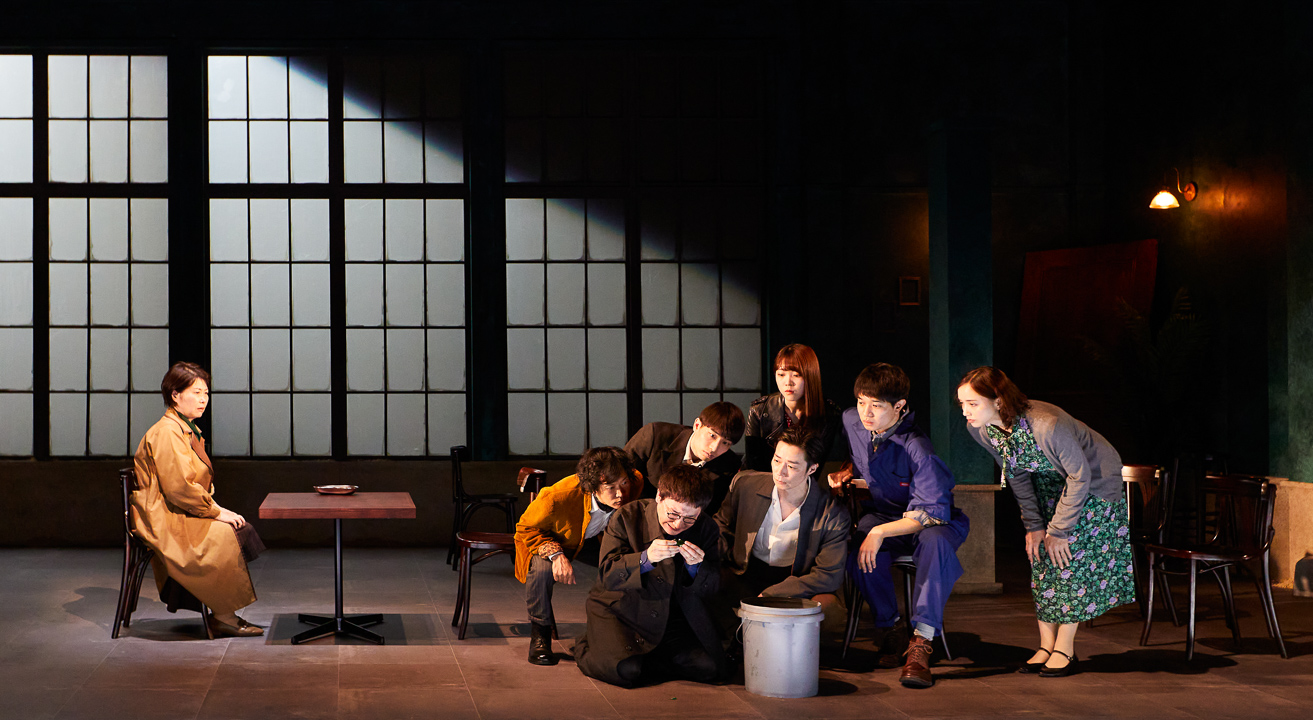
Ikiume’s Paris staging of À la Marge (2022). Photo: Pierre Grosbois
Speaking of that, in 2023, The Sun was staged in Korea, using Korean actors speaking Korean.- That’s right. I wasn’t able to check what changed at the translation stage, for better or for worse. I went and saw it in Korea, and it was really good. How can I put it, it was passionate. Their expressions were very emotional, so I felt like that must be a national characteristic. I think there must have been an intention on the part of the director, but the Nox were depicted as having robot-like, inhuman bodies, and that sort of caricatured expression made the themes come across clearly, which was a new discovery for me. I think it helped me develop a stronger belief in my own script.
-
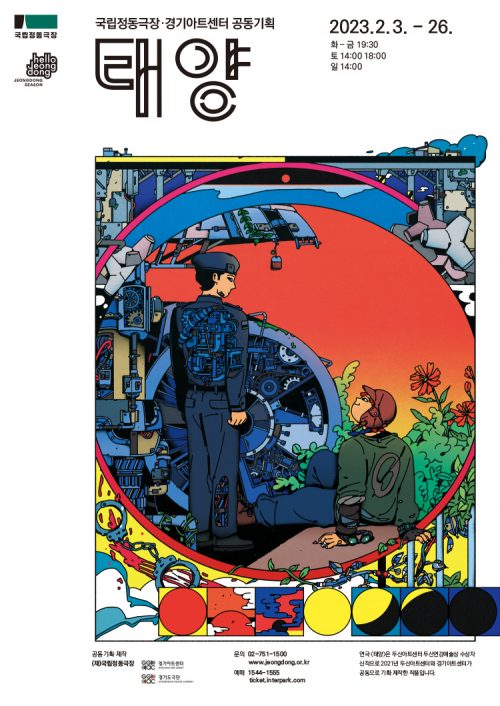
Poster from the 2023 Seoul staging of The Sun with a Korean cast
- Lee Hong-i, who translated your script into Korean, is actively translating plays by other young Japanese playwrights, and introducing them to Korean producers and theaters. It seems that she had a big influence on your play being staged in Korea.
- That’s right. One day, Lee Hong-i said to me, “If you have some work you’re especially fond of, please tell me about it.” So I gave her several scripts, and the next time we spoke, she said, “It was interesting, so I translated it,” and I was really surprised. When she reads a Japanese play that she thinks is interesting, she will pass it on to the right people. For example, if there is a director in Korea who likes science fiction, she will think he might like some Maekawa plays and pass them along. I’m really helped a lot by her passion for Japanese theater.
Thanks to that connection, there are plans to stage Enemy of Heaven and Mathematical Domino in Korea this year. There are also plans to put on a play in Taiwan this year.
-
Translator Comment 6 Korean: Lee Hong-i
It was so strange how unpopular science fiction was in Korea until a few years ago, when suddenly a sci-fi boom was upon us. That was right around when Tomohiro Maekawa’s work was brought to South Korea, and I think it was perfect timing. The theatergoers and readers in Korea welcomed this new SF work and received fresh inspiration from it. It was truly a story we’d never read before. Without an understanding of Japanese culture, there were naturally parts that would be difficult to understand. For example, in The Sun, there is a line about New Year lottery cards, and I had to add a little bit of explanation, but that wasn’t too difficult. More important was the theme within the work that spoke to us. The extremely polarized society depicted in the work wasn’t the future, but truly the world of the present day. In particular, at a time when Korean society was conflicted over issues relating to the COVID vaccine, The Sun was accepted even more as a realistic story.
Mr. Maekawa’s works like Strolling Invader and The Sun have left a strong impression on Korean theatergoers and readers. Personally, I think this is because they contain both typical and atypical SF elements. Reading his plays, including his other works that have occult and fantasy elements, makes me want to read works from the generations before him. Thanks to Mr. Maekawa, I’ve become addicted to the charms of fictional worlds.
- Do you have any advice for young artists who want to take their work overseas?
- Even if you get your script translated and published overseas, that doesn’t mean it’ll be staged immediately. I have felt that myself. Of all the many plays out there, to get a small Japanese play into someone’s hands is a difficult task. But one thing I realized when we put our show on in France was that you can’t just send your script overseas. You first have to go there yourself and put it on. In the past, part of me was skeptical about putting on surtitled shows, but thanks to people in France encouraging us, we did it and the result was that audience liked it a lot and wanted to know when we were returning and what I was doing next. Thanks to reviews and articles coming out in French, my name became known, and it made me want to have more of my works known, so I would say first you’ve got to physically go there.
- In a recent article you said that you changed your writing style with À la marge and subsequent work. Was there any reason for this change?
- I wouldn’t say I changed it so much as it changed. I developed a strong urge to write something different, and I feel like À la marge depicts my own damaged mental state caused by the pandemic. The next one, To Deliver a Soul (2023) is also like that. It’s just the way it turned out, but I noticed that they were different from what I’d written up to this point, and I didn’t try to stop that change.
I had always constructed plots very precisely when writing, but instead of doing that this time, I got enough material together and then tried to improvise the writing as I much as I could.
I simply want to write good things. I want to best myself with my writing. That feeling is very strong and so perhaps that’s the reason. When I’m writing, it’s like I’m having a revelation, like something outside myself is going into it, and I wanted to try and incorporate that feeling even more strongly. That might come off a bit spiritual, but I wanted to elevate my subconscious more skillfully, so I tried not writing a plot.
My awareness of a lot of things changed during the coronavirus pandemic. I still haven’t sorted a lot of that out within myself. When I put it into words to do so, it becomes very superficial. It’s not something I can verbalize consciously, and I wanted to try incorporating something I can only grasp on a subconscious level into my work. What came out was sometimes incoherent, but if I can connect to my subconscious well, I can encounter thoughts, perspectives, and emotions that I hadn’t considered before. Sometimes I surprise even myself.
As a result of changing my approach and becoming freer, I’ve created some methods that I have never done before. I began having characters narrate the internal states of other characters, like phrases from a novel, beginning with À la marge. I’ve liked the sort of Greek chorus style of staging for several years now, so with that in mind, I was able to instinctively incorporate it into my plays.
I think I’ll stick with this style for a while, and I’ve used the storytelling mechanism in To Deliver a Soul as well, and theme-wise, it was sort of an extension of À la marge. The latteris a story about liberation. Two people realize the strangeness of the society in which they live, break free from it, and build new values. The others oppose this and whisper, “You’ll never achieve that. You’ll die, you’ll definitely die.” But it ends with the two leaving. The idea of what they’d do outside society once they left then provided the spark for writing To Deliver a Soul.
- Let’s turn to the themes of your work. Do you have a theme you want to write about now?
- The Obelisk of the Beast (2019) recently started streaming on STAGE BEYOND BORDERS. It has a message that is similar to The Sun, dealing with environmental issues, or rather it’s a depiction of nature and civilization no longer in sync. It is also connected to the world of yokai (supernatural creatures), which I love, by which I mean cities these days have no place for yokai to live. A world where yokai can’t live is surely also a society where it’s hard for minorities to live. Cities are designed for non-disabled people who have a certain degree of physical strength. I think a society with enough space for yokai to live is an inclusive society. For example, in The Sun, the Nox are very clean and intellectual, very forward-thinking, but they still have something missing. Of course, the Curios do as well, which is why they must accept one another, and combine their strengths. But they compare, get jealous, and grow to hate one another. They can’t get along well together.
My play To Mr. Gegege (2018) explores the sentiments of manga artist and yokai researcher Shigeru Mizuki that a society that places humans at the center is a hard one for yokai to live in, which has resulted in a loss, and that humans actually aren’t the main character of our planet. Today, “life” gets all the attention and “death” isn’t visible, but Mizuki depicted a world of nature in which death was not absent. He clearly inscribed his tales with the ease at which humans can die, which is very beautiful yet frightening. We want to see it, but we can’t, though we feel like it’s there. That’s depicted properly. I think this sort of thing epitomizes the themes of my work.
- Why do you choose theater to communicate those themes? What is something that theater lets you do?
- I think the way people use their imaginations in film and theater are totally different. With theater, we use things to stand in for other things and there is an element of pretense, so a certain amount of space is necessary, and that space allows us to share something with the audience. For example, even if there’s no door, the actor’s movements allow both the audience and the actor to see the same thing, even though it isn’t there. Theater makes it possible to actively use the imagination in this way. In film, every detail is recorded, and it’s like you fill the screen with detail to express something. With theater, be it with set design or the actors’ performances, something is intentionally left blank, which is filled in by the audience, which they are forced to imagine. Making something exist that doesn’t exist, making an image within the audience’s mind is something we can do, and sometimes the result is even more real than the most elaborate CGI. Right now, if you have words and bodies on a bare stage, that is enough. By drawing out the imaginations of the audience, things that are real to each individual appear onstage.
- Lastly, what are your future aspirations? What things would you like to try next?
- Let’s see. I’d like to do something on the theme of Buddhism. And regardless of whether I tackle it in the form of a play or not, I haven’t written much about myself, so I feel like I need to take some time to work on something like that. The experiences I had in my teens, the problems my family had, I feel like I’ve reached the age where I can get some perspective on those sorts of things.



